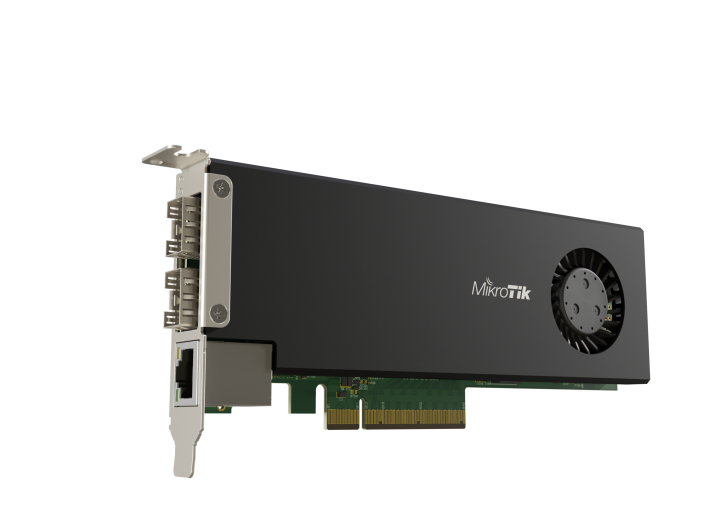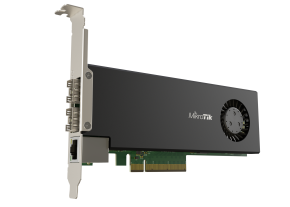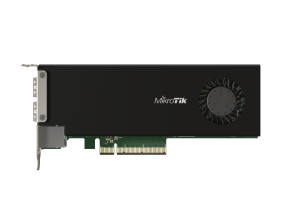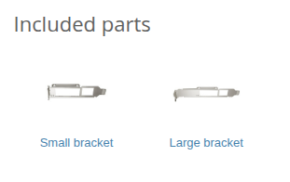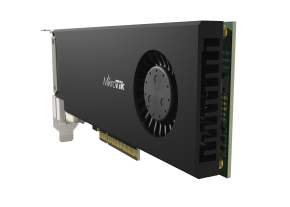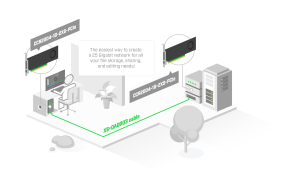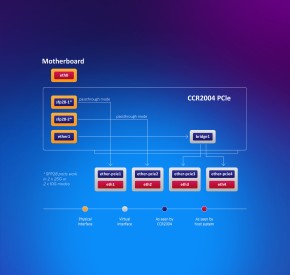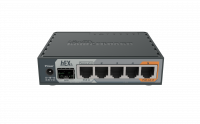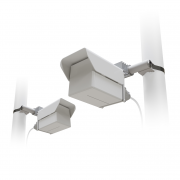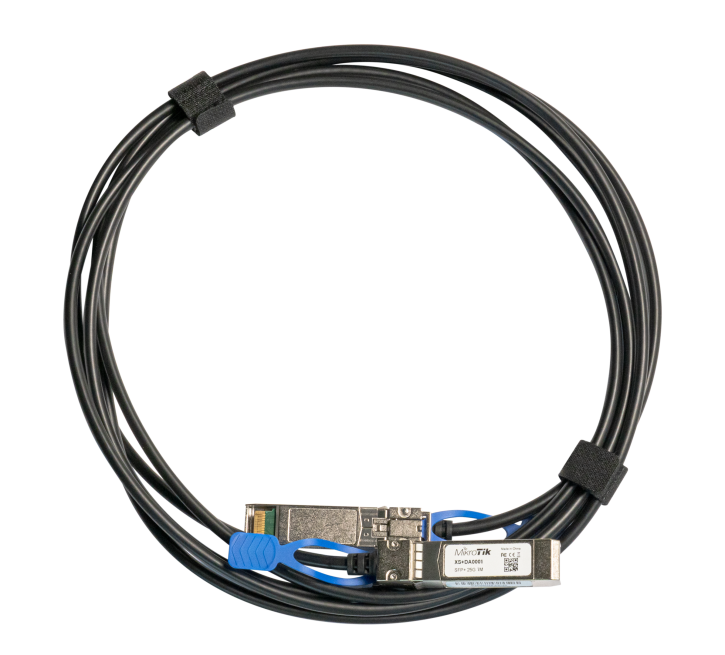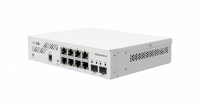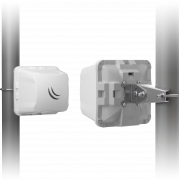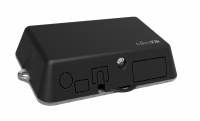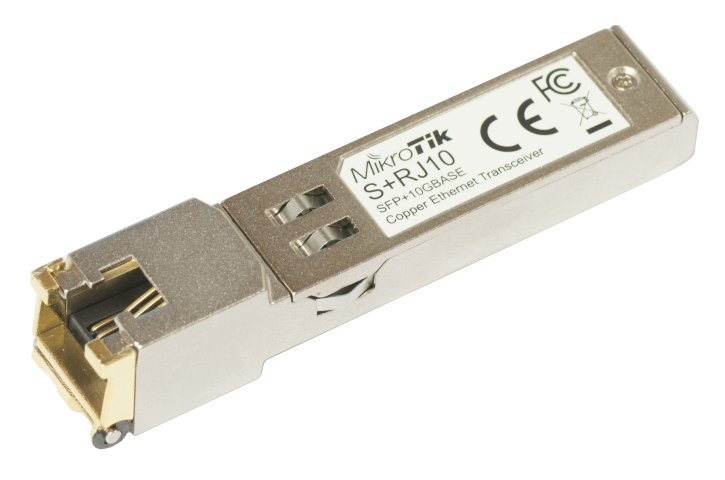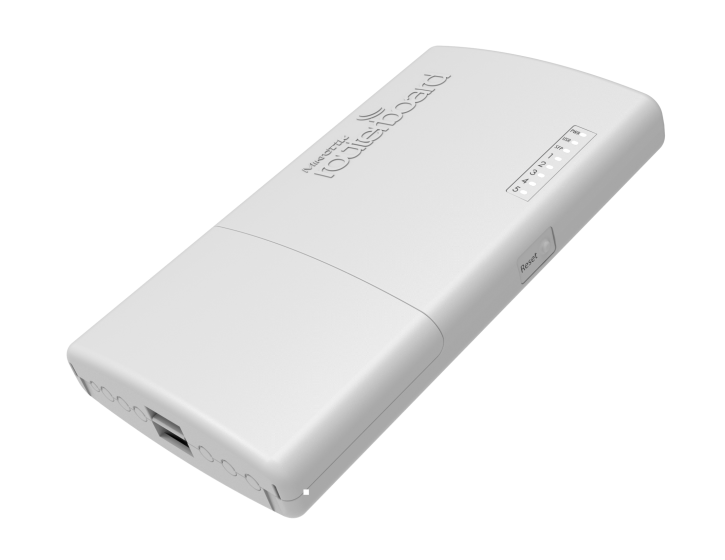MikroTik CCR2004-1G-2XS-PCIe
Product.Nr.: CCR2004-1G-2XS-PCIe
Manufacturer: MikroTik
https://mikrotik.com/product/ccr2004_1g_2xs_pcie
176,12 EUR
incl. 19 % VAT
product description
#1: CCR2004-1G-2XS-PCIe
Save space in your server room by adding a real CCR2004.. within the server itself! This unique product combines a simple 2x 25 Gigabit PCIe Ethernet adapter with the impressive capabilities of a fully-fledged router.
By default, the PCIe interface will show up as four virtual Ethernet interfaces. Two interfaces in passthrough mode to the 25G SFP28 cages. Remaining two virtual Ethernet-PCIe interfaces are bridged with the Gigabit Ethernet port for management access. The user can configure all interfaces and settings freely since we are running fully functional RouterOS here.
To get this CCR device to work as an NIC, a new Passthrough mode was implemented. Basically, a FastForward FastPath mode that can also pass hardware link statuses.
This NIC can reach wire-speed (100Gbps) with Jumbo frames. It ensures that in most server setups this CCR network card will not be the bottleneck.
With 4 GB of RAM, 128 MB of NAND storage, and a powerful quad-core ARMv8 64-bit CPU, this device can handle a lot: firewalls, user management and access control for home media and file servers, and even some traffic control in data centers – without the need for a stand-alone router.
This form-factor does come with certain limitations that you should keep in mind. The CCR NIC card needs some time to boot up compared to ASIC-based setups. If the host system is up before the CCR card, it will not appear among the available devices. You should add a PCIe device initialization delay after power-up in the BIOS. Or you will need to re-initialize the PCIe devices from the HOST system.
Can be implemented via Linux as follows:
- echo “1” > /sys/bus/pci/devices/0000:03:00.0/remove
- sleep 2
- echo “1” > /sys/bus/pci/rescan
where 0000:03:00.0 is this device ID
MikroTik is looking forward to see your unique use-cases for this unconventional device: a simple high-speed networking card combined with a powerful Cloud Core Router.
Unleash the potential of your server with the fierce power of RouterOS!
Installation: The unit is supported by Linux (minimum kernel version 5.15.25) and RouterOS (minimum version 7.x) - but is not recognised under Windows.
#2: Im Lieferumfang enthalten | Included in delivery
| 1x | CCR2004-1G-2XS-PCIe | |
| 1x | Kleine Halterung | (Small bracket) |
| 1x | Große Halterung | (Large bracket) |
#3: Spezifikationen - Technische Details | Specifications - Technical details
| Details | |
|---|---|
| Product code | CCR2004-1G-2XS-PCIe |
| Architecture | ARM 64bit |
| CPU | AL52400 |
| CPU core count | 4 |
| CPU nominal frequency | 1500 MHz |
| Dimensions | 170 x 69 x 18 mm |
| RouterOS license | 6 |
| Operating System | RouterOS (v7 only) |
| Size of RAM | 4 GB |
| Storage size | 128 MB |
| Storage type | NAND |
| MTBF | Approximately 200'000 hours at 25C |
| Tested ambient temperature | -20°C to 60°C |
| IPsec hardware acceleration | Yes |
Powering
| Details | |
|---|---|
| Max power consumption | 29 W |
| Max power consumption without attachments | 22 W |
| Cooling type | 1 fan |
Ethernet
| Details | |
|---|---|
| 10/100/1000 Ethernet ports | 1 |
Fiber
| Details | |
|---|---|
| Number of 25G SFP28 ports | 2 |
Other
| Details | |
|---|---|
| CPU temperature monitor | Yes |
| Current Monitor | Yes |
| PCB temperature monitor | Yes |
| Voltage Monitor | Yes |
Certification & Approvals
| Details | |
|---|---|
| Certification | CE, EAC, ROHS |
| IP | 20 |
#4: Test Resultate nach RFC2544 | Test results according to RFC2544
Ethernet test results
| CCR2004-1G-2XS-PCIe | AL52400 - all port test | ||||||
| Mode | Configuration | 1518 byte | 512 byte | 64 byte | |||
| kpps | Mbps | kpps | Mbps | kpps | Mbps | ||
| Passthrough | none (fast path) | 2341.4 | 28434 | 2349.6 | 9624.1 | 2339.3 | 1272.6 |
| Bridging | none (fast path) | 1119.9 | 13600.1 | 1640.9 | 6721 | 2339.3 | 1272.6 |
| Bridging | 25 bridge filter rules | 793.9 | 9640.9 | 914 | 3743.6 | 1350.5 | 734.7 |
| Routing | none (fast path) | 1084.2 | 13166.3 | 1404.6 | 5753.4 | 2339.3 | 1272.6 |
| Routing | 25 simple queues | 827 | 10043.4 | 968.5 | 3966.9 | 1460.4 | 794.5 |
| Routing | 25 ip filter rules | 567.6 | 6892.7 | 641.4 | 2627.1 | 801.2 | 435.9 |
- All tests are done with Xena Networks specialized test equipment (XenaBay),and done according to RFC2544 (Xena2544)
- Max throughput is determined with 30+ second attempts with 0,1% packet loss tolerance in 64, 512, 1518 byte packet sizes
- Test results show device maximum performance, and are reached using mentioned hardware and software configuration, different configurations most likely will result in lower results
IPsec test results
| CCR2004-1G-2XS-PCIe | AL32400 IPsec throughput | ||||||
| Mode | Configuration | 1400 byte | 512 byte | 64 byte | |||
| kpps | Mbps | kpps | Mbps | kpps | Mbps | ||
| Single tunnel | AES-128-CBC + SHA1 | 203 | 2273.6 | 204.1 | 836 | 202.2 | 103.5 |
| 256 tunnels | AES-128-CBC + SHA1 | 232.4 | 2602.9 | 230.5 | 944.1 | 222.2 | 113.8 |
| 256 tunnels | AES-128-CBC + SHA256 | 232.4 | 2602.9 | 230.5 | 944.1 | 222.2 | 113.8 |
| 256 tunnels | AES-256-CBC + SHA1 | 232.3 | 2601.8 | 227.3 | 931 | 238.1 | 121.9 |
| 256 tunnels | AES-256-CBC + SHA256 | 232.3 | 2601.8 | 227.3 | 931 | 238.1 | 121.9 |
- All tests are done with Xena Networks specialized test equipment (XenaBay),and done according to RFC2544 (Xena2544)
- Max throughput is determined with 30+ second attempts with 0,1% packet loss tolerance in 64, 512, 1400 byte packet sizes
- Test results show device maximum performance, and are reached using mentioned hardware and software configuration, different configurations most likely will result in lower results
The device has an operating system preinstalled and licensed. No separate purchase is necessary and the product is ready to use. The device includes free software updates for the life of the product or a minimum of 5 years starting from date of purchase..
#5: Produktvideo, Hinweise & Tipps | Product video & tips
| MikroTik Produktvideo 💡 | MikroTik product video | Öffnen | Open |
| Broschüre | Brochure | Öffnen | Open |
| Kurzanleitung | Quick Guide | Öffnen | Open |
| Benutzerhandbuch | User manual | Öffnen | Open |
| RouterOS-Softwarehandbuch | RouterOS software manual | Öffnen | Open |
| RouterOS, SwOS & CHR [Software/Updates] | RouterOS, SwOS & CHR [current releases] | Öffnen | Open |
| SFP, SFP+, SFP28, SFP56, QSFP+, QSFP28, QSFP56 - Kompatibilitätsliste | SFP, SFP+, SFP28, SFP56, QSFP+, QSFP28, QSFP56 - Compatibility list | Öffnen | Open |
| Abmessungen | Dimensions | Öffnen | Open |
| Blockdiagramm | Block Diagram | Öffnen | Open |
| Konformitätserklärung (CE) | Declaration of conformity (CE) | Öffnen | Open |
| MikroTik Newsletter in unserem Blog 💡 | MikroTik Newsletter in our blog | Öffnen | Open |
| Hinweise zu RouterOS, 60GHz, RMA und mehr in unserem Blog 💡 | Information about RouterOS, 60GHz, RMA and more in our blog | Öffnen | Open[EN] |
| Bei Fragen melden sie sich gerne bei uns! 💡 | If you have any questions, please do not hesitate to contact us! | [Send an E-Mail] 💡 |

